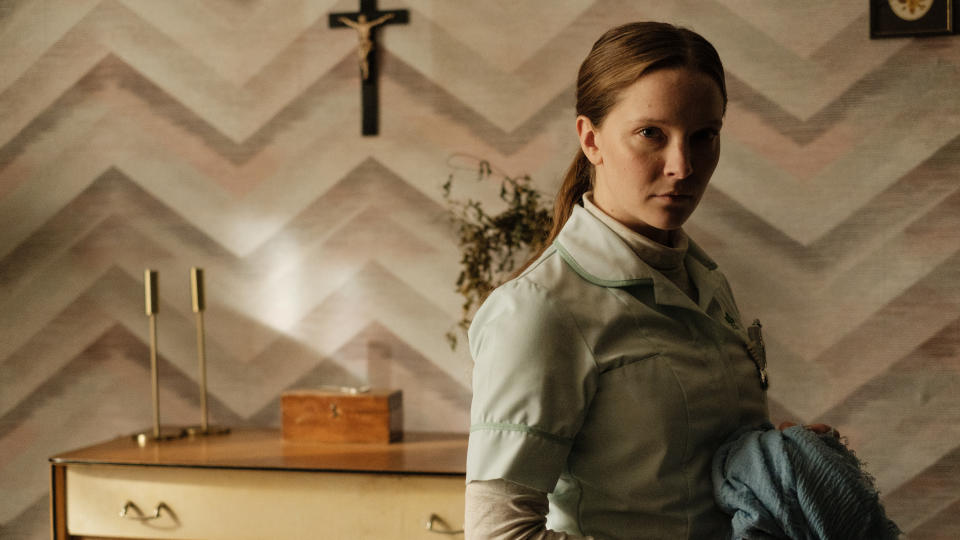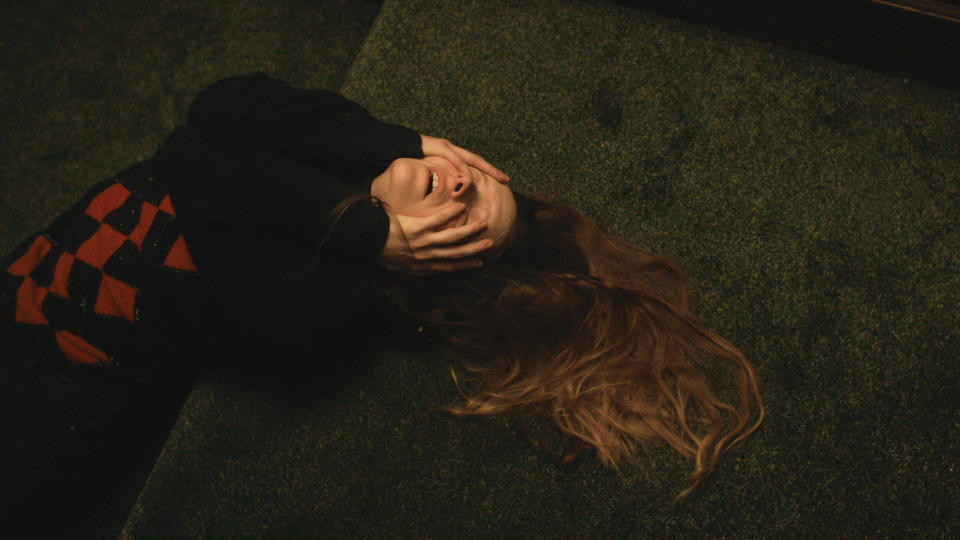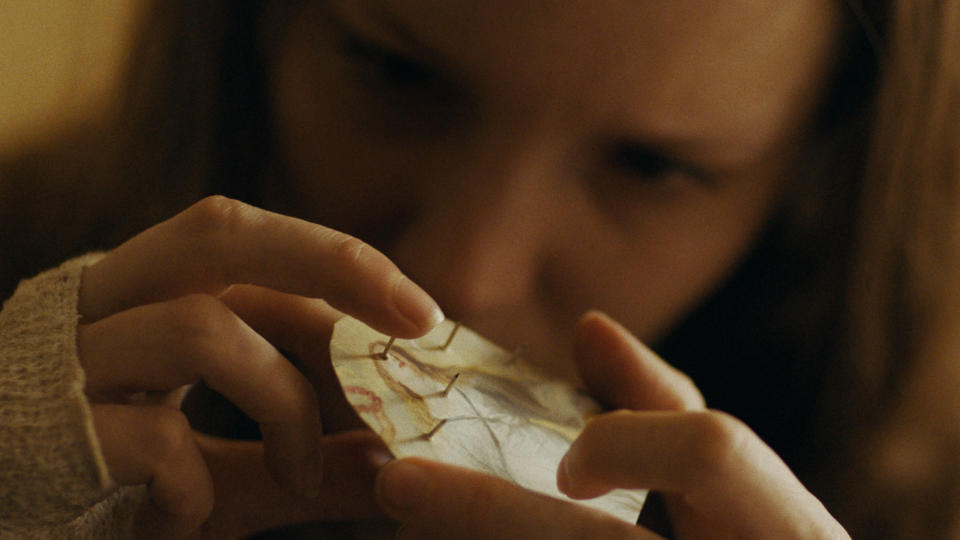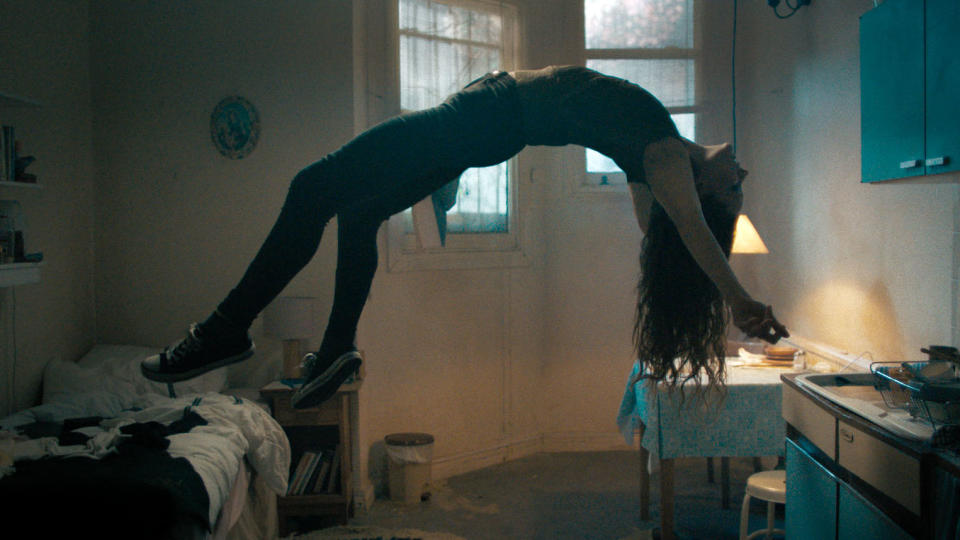'Saint Maud' director Rose Glass says 'elevated horror' is a 'snobby' term (exclusive)
Watch: Terrifying trailer for Saint Maud
Saint Maud director Rose Glass is ‘not too bothered’ about what genre people want to put the film in, but said the controversial term ‘elevated horror’ strikes her as ‘a bit snobby’.
The debut filmmaker behind the new British chiller said that the genre of her story was not a big consideration during the writing process.
Maud follows Morfydd Clark’s title character — a devoutly religious nurse — as she cares for a terminally ill former dancer, played by Jennifer Ehle, and is drawn into dark obsession.
“I’m not too bothered about what genre the film is, to be honest,” Glass told Yahoo Movies UK.
Read more: Halloween 2020 viewing guide
“In my head, Maud has always been a f***ed up, hopefully fun character study which definitely veers into horror. That’s always how I’ve thought about it.”

Glass said she finds the discussion around “elevated horror” understandable, given people’s desire to mark out the difference between films like Saint Maud and rollercoaster multiplex rides like Insidious.
She added: “People want to have an idea of what kind of thing they’re going to see and spend their money and time going to watch.
“So if somebody really wanted to see a horror film because they know they want to have lots of jump scares and for it to fulfil a certain kind of urge, then that’s fine.
“I get why Saint Maud and some of the other elevated horror titles may not scratch that itch. I like to think that they do something else equally fun or interesting.
“The word ‘elevated’ slightly rubs me up the wrong way because it sounds a bit snobby.”

Glass said that she wouldn’t describe herself as a horror specialist, but revealed she tends to be “attracted to stories that are dark and messed-up” and cited John Waters as her favourite director.
The 31-year-old filmmaker said her next movie will either be an America-set dark love story or a film with elements of body horror.
Read more: Most disturbing movie scenes of all time
She added: “I like films that are provocative and, for me anyway, the thrill of going to the cinema is quite a voyeuristic, illicit kind of feeling.
“I like the films where you feel like you’re watching something you shouldn’t be.”
Read the full interview with Rose Glass, in which we discuss female filmmakers in horror, the directors who inspire her and how Saint Maud prepared Morfydd Clark for her Lord of the Rings role...

Yahoo Movies UK: I wanted to start really with the end. Obviously without spoiling anything, how often do people come up to you and say that final shot really destroyed them?
Rose Glass: I’ve heard that last shot has gone down well and people liked it, which is very gratifying. It’s fun watching it in the cinema with an audience and knowing that it’s coming.
It has been quite a long road for this film to get to UK cinemas, through the production and then with it premiering over a year ago. What has it been like to watch it coming out across the world and wonder when it would be released in its home country?
Very weird, but I guess everything is weird for everyone at the moment. The year before all this happened, just making a film in and of itself felt so surreal to actually be doing it. I’ve just been going with the flow.
We’d got all geared up to come out in America and we were a few days from getting on the plane to do a whole press tour. I was really nervous and stressed about it, but then I had got geared up to do it and it all got cancelled due to lockdown. So I had about a week of being like “oh for f***’s sake”, but nothing puts your problems into perspective like a global pandemic.
Frankly, I’ve just been getting on with writing to be honest, which is quite a good distraction. It involves living like a hermit anyway, so lockdown leant itself to that quite well. That said, I am really looking forward to it finally coming out in cinemas. To me, it seems like the main thing happened already with when it had the premiere and festivals and all of that. That felt so big to me and the rest of the team that I keep sort of forgetting that it hasn’t actually happened yet.
But I just walked past Hackney Picturehouse the other day and saw posters all over the doors, so that made it hit home a little more. It’s very weird, basically, but very nice.

To take it right back to the start, how did this idea first come about for you?
I think I started coming up with a rough version of it towards the end of NFTS [National Film and Television School] where I did my MA, so that was in 2014. At that point, the hook I came up with that I thought sounded fun was like a two-hander between a young woman and God. God was going to be a voice you were going to hear throughout the film and it was much more like a weird, kind of f***ed up romance between the two of them.
But it started to feel a bit gimmicky when I started developing it and I became a bit more interested in Maud’s relationship with her patient and the real world and how she got that way. Then it started building a little more into the mental health side of it.
There was a long, protracted development process. I think for the next couple of years I was just working regular jobs and reworking the story of Maud in a pitch document. Then eventually it got picked up by Film4, so then we were officially in development and writing the script for a couple of years. The story kept changing a lot and then it all happened. It’s a combination of stuff that I’m interested in.
You mentioned the mental health element there, which is obviously a really tough thing to handle and get right. I’m keen to ask about your research process and any consultation you did with healthcare professionals?
I didn’t give Maud a diagnosis while I was writing her. I tried to just write her fairly instinctually and then maybe, in hindsight, would look back and say “maybe she shows aspects of whatever diagnosis”. But I’m not a psychologist and I didn’t want it to be too much like: “this is an in-depth dive into schizophrenia, or PTSD, etc”. Probably you can interpret what’s going in her head in a number of ways, so I didn’t want to be too prescriptive or pedantic about it.
I’ve always been interested in the disparity between what’s going on in our heads and what we present to the rest of the world and how different those inner and outer universe can be. So it was fun and interesting to kind of push that theme, I guess. The whole film arose from an interest in that — how subjective and individual realities are and how dangerous that can be.

And how hard was it then, once you had all of that story in place, to find your Maud? Morfydd Clark is fantastic in this film.
She’s great, isn’t she? She was one of the last people we saw. We did quite a lengthy audition process over the course of like a year while I was still writing the script. We hadn’t been greenlit or anything. I think a lot of the decision of whether or not the film would actually fall into place hinged on whether we could find Maud, because obviously if you can’t find the right person to play that role then the whole film falls apart.
She was one of the last people we saw. She sent in a tape and just immediately on screen she has this completely haunting kind of look. She looked quite fragile, but then was actually quite spiky and intimidating. But then also she can be incredibly funny. It’s a very contradictory character, or that’s what we were aiming for anyway. I like stories that have unreliable narrators and main characters who are antiheroes. You’re not sure whether you can trust them or not. It kind of seems closer to reality to me because I don’t think anybody is ever totally one thing or the other.
It’s quite a lot to demand, but she’s a real chameleon. She’s the source of fear in the film, as well as being the person we’re afraid for. She was very versatile and certainly very fun and chilled to work with, so it was a surprisingly light atmosphere on set. I’d love to work with her again.
I’d love you to work with her again. She’s fantastic!
If she has time between Lord of the Rings! Weirdly, Maud is maybe not such a bad prep for Galadriel. We know she looks great in a robe now and apparently Elvish is originally based on Welsh as a language, and she rocks a bit of Welsh in Saint Maud. So I take total credit for anything.
Read more: Tolkien fans aghast at Lord of the Rings nude scene rumours
So when she turns out to inevitably be brilliant in Lord of the Rings, you’re taking the credit for that?
Exactly. I was a massive Lord of the Rings nerd when I was younger as well, so it’s very cool.

One of the things that’s great about Saint Maud is that it’s a really full-blooded horror film. Are there other horror directors who have inspired you over the years or whose careers you take inspiration from?
Not specifically horror ones, to be honest. I’m kind of realising, having now made a horror film and gone round genre festivals with it, how lacking I am in my genre nerd credentials. I wouldn’t call myself a horror buff. I’m definitely attracted to stories that are dark and messed-up. I’ve got a few different ideas for films and one of them is maybe kind of a horror.
In terms of directors who are personal sources of inspiration, for me it would probably be somebody like John Waters. I know he’s not a horror director at all, but if anybody asks who my favourite filmmaker is, I tend to say him. His films aren’t my favourite but, as a person, having the attitude he does towards filmmaking and storytelling seems so joyous and gleefully obscene.
Just absolute bravery, I think, to do whatever he wants.
Exactly, yeah. I sometimes worry that some films, or maybe the discussion around films nowadays, seems sort of timid. I like films that are provocative and, for me anyway, the thrill of going to the cinema is quite a voyeuristic, illicit kind of feeling. I like the films where you feel like you’re watching something you shouldn’t be. Films can give you a window into other people’s lives in a way you’d never get to do in reality, so you might as well make it interesting.

I think the way we discuss films like this is quite interesting. Saint Maud has been pulled into this discussion around the strange term “elevated horror”, and the fact you got picked up by A24 in the USA added to that. How do you feel about that term and that discussion?
The whole A24 thing and A24 horror — I didn’t realise that was a thing. I didn’t realise what a whole thing they are, because I’m not on Twitter. I was missing out on that one.
With the elevated horror thing, I kind of get why people want to make a distinction. People want to have an idea of what kind of thing they’re going to see and spend their money and time going to watch. So if somebody really wanted to see a horror film because they know they want to have lots of jump scares and for it to fulfil a certain kind of urge, then that’s fine. I get why Saint Maud and some of the other elevated horror titles may not scratch that itch. I like to think that they do something else equally fun or interesting.
The word “elevated” slightly rubs me up the wrong way because it sounds a bit snobby. I’m not too bothered about what genre the film is, to be honest. In my head, Maud has always been a f***ed up, hopefully fun character study which definitely veers into horror. That’s always how I’ve thought about it. I’ve been told that people find it very scary, but I have lost all perspective on everything.
Watch: Are we in the age of elevated horror?
One of the things with horror today is the rise of so many great female voices. Is that something you’ve noticed, both in horror and in cinema generally?
In cinema generally, definitely. Not in horror specifically. I feel like a lot of people are saying there’s a female horror renaissance and maybe I’m being a massive cynic, but I think that seems to come more from people wanting to have intellectual discussions about some intrinsic link between womanhood and horror.
It’s great that there are more women making films that are getting out there. I think we’re definitely benefiting from a lot of discussion and work that has been going on in recent years to get the industry and audiences as a whole aware of that.
But in terms of why there are more horror films that people point to, I think that horror has always been a genre that first-time directors are attracted to or that’s often tempting. Sometimes they’re easier to get made, there’s more of a built-in audience, it lends itself to more creative storytelling and being able to play with more abstract things.
Read more: Welcome to the Blumhouse producer on horror diversity
I think it’s great that we’re starting to see more diversity in storytellers — both directors and writers. To me, the fact that I have been able to make a film is not that radical. I’ve been trying to do this since I was about 12 and I happen to be coming up at a time when people are particularly receptive, which is great. But I’m still a white, privately educated, middle class person, as are most directors. There are plenty of other obstacles in people’s ways to try to get into the industry who come from different backgrounds.
More of it, basically. Personally, I worry with the way sometimes it gets talked about that it seems a bit of a kind of “eat your greens” sort of thing. For me, variety and diversity of storytellers is important, not just because of socio-political stuff, but also creatively. It makes for a more interesting, diverse selection of films for people to go and see, which is just better for audiences and more fun. With people who have more varied life experiences, whether that’s because of their gender or sexual orientation or class or where they’re from, you’re going to have more interesting and diverse stories.

Just before I let you go, I wanted to ask about the other projects you mentioned. What is it you’re looking to do next and are you looking to stay in the horror genre?
I can’t say for definite, but I’m hoping to shoot something next year which is set in America and is a f***ed up love story of some kind. I’ve got another one, which has maybe got a foot in body horror. They’re all weird mash-ups and we’re not entirely sure what genre they are.
I’m always going to be interested in the weird, varied things that make people tick and trying to make them as surprisingly accessible and universal as possible. Watch this space. I’m really looking forward to getting on and doing another one.
Saint Maud is in UK cinemas from 9 October.

 Yahoo Sport
Yahoo Sport 





































